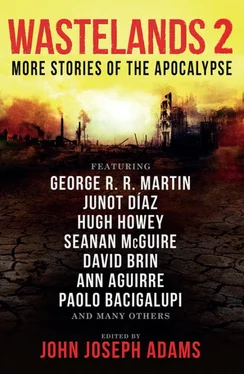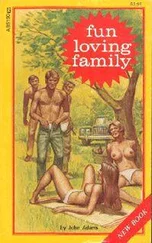“Sometimes, out here at night, I forget,” he said softly, more to himself than to me. “The sky still looks the same as it did before the Blast. And the stars don’t know the difference. If I don’t look east, I can almost pretend it never happened.”
I shook my head. “Keith, that’s a game. It did happen. You can’t forget that. You know you can’t. And you can’t go back. You know that, too.”
“You don’t listen, do you, Gary? I do go back. I really do.”
“You go back to a dream world, Keith. And it’s dead, that world. You can’t keep it up. Sooner or later you’re going to have to start living in reality.”
Keith was still looking up at the sky, but he smiled gently as I argued. “No, Gary. You don’t see. The past is as real as the present, you know. And when the present is bleak and empty, and the future more so, then the only sanity is living in the past.”
I started to say something, but he pretended not to hear. “Back in the city, when I was a kid, I never saw this many stars,” he said, his voice distant. “The first time I got into the country, I remember how shocked I was at all the extra stars they’d gone and stuck in my sky.” He laughed softly. “Know when that was? Six years ago, when I was just out of school. Also last night. Take your pick. Sandi was with me, both times.”
He fell silent. I watched him for a few moments, then stood up and brushed myself off. It was never any use. I couldn’t convince him. And the saddest part of it was, I couldn’t even convince myself. Maybe he was right. Maybe, for him, that was the answer.
“You ever been in the mountains?” he asked suddenly. He looked up at me quickly, but didn’t wait for an answer. “There was this night, Gary—in Pennsylvania, in the mountains. I had this old beat-up camper, and we were driving through, bumming it around the country.
“Then, all of a sudden, this fog hit us. Thick stuff, gray and rolling, all kind of mysterious and spooky. Sandi loved stuff like that, and I did too, kind of. But it was hell to drive through. So I pulled off the road, and we took out a couple of blankets and went off a few feet.
“It was still early, though. So we just lay on the blankets together, and held each other, and talked. About us, and my songs, and that great fog, and our trip, and her acting, and all sorts of things. We kept laughing and kissing, too, although I don’t remember what we said that was so funny. Finally, after an hour or so, we undressed each other and made love on the blankets, slow and easy, in the middle of that dumb fog.”
Keith propped himself up on an elbow and looked at me. His voice was bruised, lost, hurt, eager. And lonely. “She was beautiful, Gary. She really was. She never liked me to say that, though. I don’t think she believed it. She liked me to tell her she was pretty. But she was more than pretty. She was beautiful. All warm and soft and golden, with red-blond hair and these dumb eyes that were either green or gray, depending on her mood. That night they were gray, I think. To match the fog.” He smiled, and sank back, and looked up at the stars again.
“The funniest thing was the fog,” he said. Very slowly. “When we’d finished making love, and we lay back together, the fog was gone. And the stars were out, as bright as tonight. The stars came out for us. The silly goddamn voyeuristic stars came out to watch us make it. And I told her that, and we laughed, and I held her warm against me. And she went to sleep in my arms, while I lay there and looked at stars and tried to write a song for her.”
“Keith…” I started.
“Gary,” he said. “I’m going back there tonight. To the fog and the stars and my Sandi.”
“Damnit, Keith,” I said. “Stop it. You’re getting yourself hooked.”
Keith sat up again and began unbuttoning his sleeve. “Did you ever think,” he said, “that maybe it’s not the drug that I’m addicted to?” And he smiled very broadly, like a cocky, eager kid.
Then he reached for his box, and his timetrip. “Leave me alone,” he said.
* * *
That must have been a good trip. Keith was all smiles and affability the next day, and his glow infected the rest of us. The mood lasted all week. Work seemed to go faster and easier than usual, and the nightly song sessions were as boisterous as I can remember them. There was a lot of laughter, and maybe more honest hope than we’d had for quite a while.
I shouldn’t give Keith all the credit, though. Winters was already well into his suggestion-making period, and things were happening around the commune. To begin with, he and Pete were already hard at work building another house—a cabin off to the side of the common house. Pete had hooked up with one of the girls, and I guess he wanted a little more privacy. But Winters saw it as the first step toward the village he envisioned.
That wasn’t his only project, either. He had a whole sheaf of maps in his jeep, and every night he’d drag someone off to the side and pore over them by candlelight, asking all sorts of questions. He wanted to know which areas we’d searched for survivors, and which towns might be worth looting for supplies, and where the rat packs liked to run, and that sort of thing. Why? Well, he had some “search expeditions” in mind, he said.
There was a handful of kids on the commune, and Winters thought we ought to organize a school for them, to replace the informal tutoring they’d been getting. Then he thought we ought to build a generator and get the electricity going again. Our medical resources were limited to a good supply of drugs and medicines; Winters thought that one of us should quit the fields permanently and train himself as a village doctor. Yeah, Winters had a lot of ideas, all right. And a good portion of ’em were pretty good, although it was clear that the details were going to require some working out.
Meanwhile, Winters had also become a regular at the evening singing. With Keith in a good mood, that didn’t pose any real problems. In fact, it livened things up a little.
The second night that Winters came, Keith looked at him very pointedly and swung into “Vietnam Rag,” with the rest of us joining in. Then he followed it up with “Universal Soldier.” In between lyrics, he kept flashing Winters this taunting grin.
Winters took it pretty well, however. He squirmed and looked uncomfortable at first, but finally entered into the spirit of the thing and began to smile. Then, when Keith finished, he stood up. “If you’re so determined to cast me as the commune’s very own friendly reactionary, well I guess I’ll have to oblige,” he said. He reached out a hand. “Give me that guitar.”
Keith looked curious but willing. He obliged. Winters grabbed the instrument, strummed it a few times uncertainly, and launched into a robust version of “Okie from Muskogee.” He played like his fingers were made of stone, and sang worse. But that wasn’t the point.
Keith began laughing before Winters was three bars into the song. The rest of us followed suit. Winters, looking very grim and determined, plowed on through to the bitter end, even though he didn’t know all the words and had to fake it in spots. Then he did the Marine hymn for an encore, ignoring all the hissing and moaning.
When he was finished, Pete clapped loudly. Winters bowed, smiled, and handed the guitar back to Keith with an exaggerated flourish.
Keith, of course, was not one to be topped easily.
He nodded at Winters, took the guitar, and promptly did “Eve of Destruction.”
Winters retaliated with “Welfare Cadillac.” Or tried to. Turned out he knew hardly any of the words, so he finally gave that up and settled for “Anchors Aweigh.”
Читать дальше












